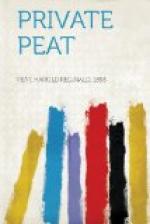“What’s the place wid the red triangle?” asked the Irish soldier, lately joined up and only out, from a Scotch-Canadian who stood near by.
“Yon? D’ye mean to say ye dinna know the meaning o’ thon? Why, mon, yon’s the place whaur ye get a packet o’ fags, a bar o’ chocolate, a soft drink and salvation for twenty-five cents.”
Yes; we get all that in the Y.M.C.A. huts where the padre toils and the layman sweats day and night for the well-being of the soldier men. In some of the huts it is actually possible to get a bath. It is always possible to get dry. ’Twas Black Jack Vowel, good friend Jack, who wrote over to tell us that there was no hut at one time near his front.
“Bad luck here, this time in. No Y.M.C.A. hut near. I was coming out last night for a turn in billets when I fell into a shell hole. It was pretty near full of water, so I got soaked to the neck, and I hit against a couple of dead Boches in it, too. Not nice. Reached the billet dripping wet. Have got a couple of sugar boxes, one at my head and one at my feet. Have coke brazier underneath. If I lie here about three hours and keep turning, I guess I’ll be dry by then.”
That’s when no padre was handy to lead the way to a hut.
Can folk wonder why we love the padres, why we reverence the Y.M.C.A.? Can folk wonder why the men who used to look on such men as sissy-boys have changed their opinions? Can folk wonder that the religion which is Christian is making an impression on the soldier? Can folk deny the fact that this war will make better men?
Once again I mention Major the Reverend John Pringle. Best of pals, best of sports, best of sky-pilots! Many a time as we have been marching along we have met him. He would pick out a face from among the crowd, maybe a British Columbia man. “Hello! salmon-belly!” would good Major John peal out. Again, he would see a Nova Scotian: “Hello! fish-eater—hello, blue-nose!”
Then through us all would go a rush of good feeling and good heart. Through all of us would go a stream of courage and happiness and a desire to stand right with the man as he was.
“Hello! Sky-pilot!”
CHAPTER XI
VIVE LA FRANCE ET AL BELGE!
We had only been about ten weeks in France when we were moved out of the trenches and placed in Ypres in billets. Some of us were actually billeted in the city itself, and others of us had a domicil in the environs.
Ypres, or Wipers, as Tommy Atkins called it, was then considered a “hot” spot. The Germans say no one ever comes back from Ypres without a hole in him. Tommy says, when he curses, “Oh, go to ——; you can’t last any longer than a snow ball in Ypres!”
At this time Ypres was not yet destroyed by the enemy. I have seen many cities of the world. I have seen the beauties of Westminster Abbey, the Law Courts; I have seen the tropical wonders of the West Indies; I have seen the marvels of the Canadian Rockies, but I have never seen greater beauty of architecture and form than in the city of Ypres. There was the Cloth Hall, La Salle des Draperies with its massive pillars, its delicate traceries, its Gothic windows and its air of age-long gray-toned serenity.




